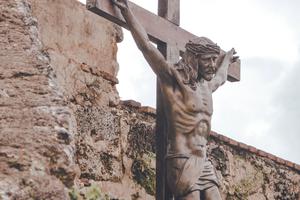Lent is a Penitential Journey Toward the House of the Father
“The whole of the Christian life is a great pilgrimage to the House of the Father,” said Pope St. John Paul II. And so we move, not in fear, but in hope, every step of the way.

In a moving tribute to the late Cardinal John Wright, who when he died in 1979 had been the highest-ranking American in the Catholic Church, his longtime friend William Clancy, whom Wright had ordained to the priesthood years before, recalled a conversation he had with Wright in which the latter told him of a Collect he prayed for the first time in Rome soon after his own ordination. This prayer, he said, had revealed to him the whole mystery of Christian humanism. A single telling sentence, in fact, had catalyzed the discovery. Speaking in the Latin he knew and loved so well, he recited it for him: Sic transeamus per bona temporalia; ut non amittamus aeterna.
What does it mean? It is a simple reminder, an exhortation actually, that we need to move through the good things of this world, so as not to lose sight of the far greater things in the world to come. “He prayed the Collect in an ancient Roman chapel,” recalls Father Clancy, “and as he prayed the sun streamed upon the marble altar where he stood. He felt at once — and all together — the splendor and the wonder and the joy of life: the pathos of its passing and the glory beyond its passing. He wept (as he often did), rejoicing, and went on with what he had to do.”
It is near the end of Lent as I write these words, which serve to sharpen the need to be especially mindful of what I have got to do in these few remaining days. And that is, like everyone else, to pick up my cross, which is the very one that God from all eternity had fashioned for me, for this time and place, and soldier on with as much courage and good humor as I can summon. Always mindful, of course, of the many good things in this world, while remaining resistant to its entrapments, lest they distract me from the journey home to God.
What is it, after all, that Lent insistently reminds us of, but that the Bridegroom has gone away, leaving us who love him to mourn his passing, meanwhile filling the emptiness with prayer and fasting so as to awaken true hunger for his return. Guide and sustain us, we say to God, into the care of whose love and mercy we entrust ourselves, so that we may move safely through the joys and sorrows of this world, en route to that heavenly home we resolutely await on the other side.
But we need to go with complete childlike confidence. This is because, to paraphrase a line from St. Catherine of Siena, all the way to heaven really is heaven, Christ having told us that he himself is the Way. There is no other way that leads into the Kingdom of heaven than the one who first blazed the trail — indeed, who identified himself as its sudden and unforeseen eruption into history. And so the promise, it turns out, will prove every bit as good as its possession. Not for a single moment does Jesus take his eyes off us. Which is why the apostles, driven desperate by the storm on the sea, then rushing to awaken the Master who is asleep in the boat, would have done better had they remembered instead that wonderful passage from the Song of Solomon: “I sleep, but my heart watches.” It would have instantly allayed all their fears.
Why else would God have counted every hair on our heads? It wasn’t enough that he number all the stars in the sky, or the fish in the sea. No, he wanted to take account of us, even bending down over our nothingness in order to raise us up higher than ever before. And does he not love us more than we love ourselves? More even than we love our sins, to quote the words Jesus himself speaks to Pascal. “Take comfort,” he tells him. “You would not seek me if you had not found me. I thought of you in my agony: I shed these drops of blood for you. Do you want it always to cost me the blood of my humanity, while you do not even shed a tear?”
These are questions that, as Pascal himself would say, take us by the throat. Meanwhile, we soldier on, knowing that, as Pope St. John Paul II repeatedly reminded us, “the whole of the Christian life is a great pilgrimage to the House of the Father.” And so we move, not in fear, but in hope, every step of the way. For if we are assured by God of eternal happiness, then it is essential that we be annealed in hope lest the weight of all that glory prove too crushing to carry. “There is no fear in love, “ Jesus tells us in the First Letter of John, “but perfect love casts out fear.”
- Keywords:
- Lent

















